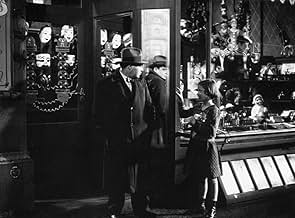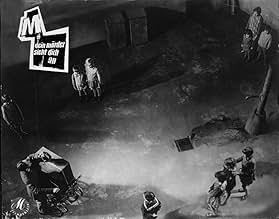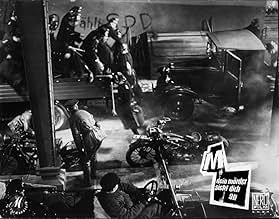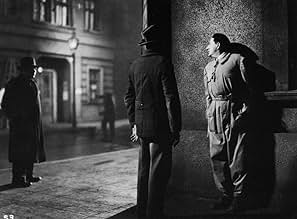Uno psicopatico che uccide bambini terrorizza una città tedesca. La polizia brancola nel buio ed allo stesso tempo investigando, crea problemi alla criminalità organizzata che decide, pur di... Leggi tuttoUno psicopatico che uccide bambini terrorizza una città tedesca. La polizia brancola nel buio ed allo stesso tempo investigando, crea problemi alla criminalità organizzata che decide, pur di togliersi la polizia dai piedi, di dare la caccia all'assassino.Uno psicopatico che uccide bambini terrorizza una città tedesca. La polizia brancola nel buio ed allo stesso tempo investigando, crea problemi alla criminalità organizzata che decide, pur di togliersi la polizia dai piedi, di dare la caccia all'assassino.
- Regia
- Sceneggiatura
- Star
- Premi
- 2 vittorie totali
Riepilogo
Recensioni in evidenza
Fritz Lang, you cinematic god! A simple story of the underworld, the police, and a single man holding an entire city hostage, and done with such precision and pre-noir darkness that is oozes creepy suspense from beginning to end.
But this movie is not so simple as the police inspectors trying to catch a devious murderer it's about the mob, employing its network of beggars and petty thieves also trying to bring the killer to their own brand of justice. Apparently, the police crackdown caused by the murders is bad for business so the mob begins to track him down as well.
It's not only a great crime story, and perhaps the first physiological thriller (the murderer is schizophrenic) but there's comments to be made here about the nature of justice, and who should best dispense it.
In all, not only a trail-blazing classic, but THE trail-blazing classic.
This film is ground-breaking for many reasons: It is Fritz Lang's first talking picture, it is one of the first in the serial killer genre and it was overtly anti-Nazi. This film was banned in Germany shortly after it premiered, and Fritz Lang and Peter Lorre, both Jews, soon fled the country. It has superb acting (most notably, Peter Lorre's trial scene in the catacombs) and very stark yet at times gritty cinematography. The story is indeed suspenseful and at times, very creepy (what whistling child killer isn't?). The entire movie, however is extremely thought-provoking and challenging, much like the German Expressionist movement itself.
This is not a movie for everyone; some may find it boring, some may find it too abstract. It also has one of the most bizarre shots I've ever seen in film - essentially it's a 30 second shot of the police inspector talking on the phone, but you're under his desk and looking up his pants leg. It actually kind of baffled me and made me chuckle for a second, but it was avant garde if anything.
To those who appreciate early cinema that truly makes you think, both about the film and the subtext with which it was written and filmed, it is a must-see.
--Shelly
Lang, a master of the German expressionist film, shot his first talkie, a crime drama considered a landmark in the story of suspense movies... It was a shocking idea for its time, based on the real-life killer Peter Kurten, headlined as the Vampire of Düsseldorf...
'M' is about a terrorized city, and a plump little man with wide eyes (often chewing candy) who is a pathological child-killer, unable to control his urge for killing...
The film embodies several Lang themes: the duality between justice and revenge, mob hysteria, the menacing anticipation of watching a helplessly trapped individual trying fruitlessly to escape as greater forces move inexorably in, and, for probably the first time in the cinema, it adds a new dimension to suspense: pity... For the killer is clearly mentally sick... He cannot overcome the overwhelming compulsion of his murderous disease, and yet, we see him hunted down and almost lynched as a criminal, rather than treated as a sick man...
Early in the film, the killer is heard whistling the Grieg theme from 'In the Hall of the Mountain King'. This theme inexorably becomes imbued with menace... And when we see no more than a girl looking in a shop window, the melody on the sound-track told us chillingly that the murderer is there, just out of sight...
The Murderer is played by Peter Lorre in a virtuoso performance that has barely been matched in all the thrillers he has made since 'Casablanca,' 'The Maltese Falcon,' and 'The Mask of Dimitrios.' When the photographs of his victims, all little girls, are shown to him, he jumps back and twitches with horror...
With powerful visuals, Lang's motion picture is Lorre's first film... His performance as the corpulent, hunted psychopath is a masterpiece of mime and suggestion... Lorre is the archetypal outsider-outside the law and society because of his compulsive crimes, outside the balancing society of the underworld because he is not a professional criminal... He had only twelve lines of dialog...
In the most famous of all about a pathological killer - Alfred Hitchcock's 'Psycho' - Anthony Perkins lacked not only the threat of the tortured Peter Lorre, but also the dimension of invoking our incredulous sympathy...
'Psycho' reeked with blood and horror, whereas the suspense of 'M' is subtle... A child's balloon without an owner, a rolling ball, are enough to tell us that another murder had been committed... The audience, trapped in its seats, torn by ambivalent feelings towards the killer, watched him trapped as the net is pulled tight...
"M" is a cinematic masterpiece of visual drama. The stunning performances define the careers of exceptional actors such as Peter Lorre and Gustaf Grundgens. Director Fritz Lang gives depth and dimension to his production by distinctly capturing the ecstasy of the film's many characters and focusing accurately on individual situations. This is an intriguing journey into the mind of a psychotic child murderer, blending terror, complexity, and malignity in one amazing motion picture.
Screenwriters Paul Falkenburg and Adlof Jansen construct the characters of "M" with distinctive personalities and three dimensional emotions. Many lesser filmmakers give their characters no creativity outside the confines of the script. In this movie each individual character has a mind of their own; they are free to roam the landscape of a inviting atmosphere.
Fabricating such an impressive atmosphere is some of the best cinematography and lighting effects that I can remember watching. This resplendent component creates the film's terrific moody ambiance. Suspense is one thing "M" contains in full context. The movie's third act is sheer peak-high tension.
Shot in black and white, "M" stars Peter Lorre as Peter-Hans Beckert, an extremely disturbed child murderer in the process of wreaking havoc on a neighborhood. Parents everywhere are living in fear of their children being kidnapped and abruptly annihilated.
This picture contains a brilliantly crafted setup. The visual setting creates a strongly developed opening. Every scene works to either complicate the initial problem or propels the story through a firm narrative through line.
The film captures the chaos of the town in terror perfectly. "M" is more about the results of a serial killer than an actual serial killer. Never do we directly witness a murder; the violent encounters are implied. This method of film making perhaps makes the movie's impact even greater. With an creative perspective through a third person point of view, the filmmakers repeatedly give us examples of a solid structure through characters and occurrences.
"M" offers a unforgettable, challenging performance by Peter Lorre. This extraordinary actor is tormenting and disturbing without embracing in extreme violent conduct. He perspires with momentum and rapture. This productions closing scenes are so deeply penetrating they entirely captivate the viewer. Isn't this what movies are supposed to do?
The murderer, artfully played by Peter Lorre, has been killing children that have no link to him personally for months. The police, despite all of their efforts, are unable to catch him, mainly because there is no rhyme or reason in his choice of victims. At first there is a focus on the victims and the hole left in their families by their killing. Then, the film shifts to two normally opposed groups - the police and the underworld. After several months of no results by the authorities, the police are unhappy because it reflects badly upon them, and the underworld is unhappy because their activities are being disrupted because of the police doing constant raids in their efforts to capture the killer.
In a particularly well-done part of the film the scene shifts back and forth between a conference of police and one of the underworld. They discuss how they are going to catch the killer. The police settle upon the idea of looking for people with a history of past mental problems that were pronounced cured and released. The underworld decides to enlist an invisible group - the beggars - to follow every child at all times and therefore catch the killer. Both groups focus on the right suspect, the question is - who gets there first? M is a fascinating film that raises many topics - the death penalty, a group of criminals that are criminals by choice causing less stress on society than a lone criminal that acts out of an uncontrollable compulsion, and the motivations of the authorities often being their own bureaucratic survival rather than the larger issue of ending a series of horrible acts against humanity.
Lo sapevi?
- QuizContrary to popular belief, Fritz Lang did not change the title from "The Murderers are Among Us" to "M" due to fear of persecution by the Nazis. He changed the title during filming, influenced by the scene where one of the criminals writes the letter on his hand. Lang thought "M" was a more interesting title.
- BlooperIn one of the police crack-down scenes, the German bar hostess keeps referring to the uniformed police officer in charge as "Herr Hauptmann." The English caption translates this as "sergeant." But, in actuality, "hauptmann" is equivalent to "captain".
- Citazioni
Hans Beckert: I can't help what I do! I can't help it, I can't...
Criminal: The old story! We never can help it in court!
Hans Beckert: What do you know about it? Who are you anyway? Who are you? Criminals? Are you proud of yourselves? Proud of breaking safes or cheating at cards? Things you could just as well keep your fingers off. You wouldn't need to do all that if you'd learn a proper trade or if you'd work. If you weren't a bunch of lazy bastards. But I... I can't help myself! I have no control over this, this evil thing inside of me, the fire, the voices, the torment!
Schraenker: Do you mean to say that you have to murder?
Hans Beckert: It's there all the time, driving me out to wander the streets, following me, silently, but I can feel it there. It's me, pursuing myself! I want to escape, to escape from myself! But it's impossible. I can't escape, I have to obey it. I have to run, run... endless streets. I want to escape, to get away! And I'm pursued by ghosts. Ghosts of mothers and of those children... they never leave me. They are always there... always, always, always!, except when I do it, when I... Then I can't remember anything. And afterwards I see those posters and read what I've done, and read, and read... did I do that? But I can't remember anything about it! But who will believe me? Who knows what it's like to be me? How I'm forced to act... how I must, must... don't want to, must! Don't want to, but must! And then a voice screams! I can't bear to hear it! I can't go on! I can't... I can't...
- Curiosità sui creditiAll of the original credits appear only in the beginning with no music.
- Versioni alternativeIn the English and French language versions, in addition to having been dubbed, had some footage re shot. These scenes include the telephone conversation between the minister and the police commissioner, and the ending of the film. Peter Lorre's performance in the trial was re shot, however this time he spoke his lines in English or French, depending upon the version. The shots of him are lit and photographed much differently than Fritz Lang's original footage. Additionally, a shot of the police arriving was inserted, taken from an earlier part of the film (whereas in the original German version no police forces are shown at all). The court scenes have been eliminated and replaced with happy endings where young children play a game similar to the one seen in the opening (English) or a smiling couple watching their children play in the street (French).
- ConnessioniEdited into Juden ohne Maske (1937)
I più visti
Dettagli
Botteghino
- Lordo Stati Uniti e Canada
- 35.566 USD
- Fine settimana di apertura Stati Uniti e Canada
- 6123 USD
- 17 mar 2013
- Lordo in tutto il mondo
- 35.566 USD
- Tempo di esecuzione1 ora 57 minuti
- Colore
- Mix di suoni
- Proporzioni
- 1.19 : 1
- 1.20 : 1

































